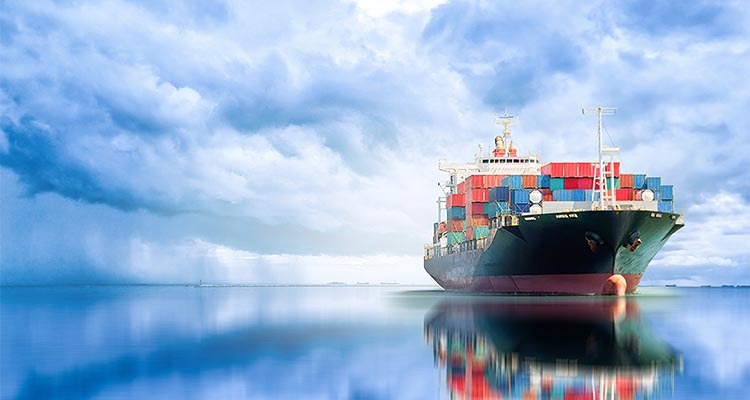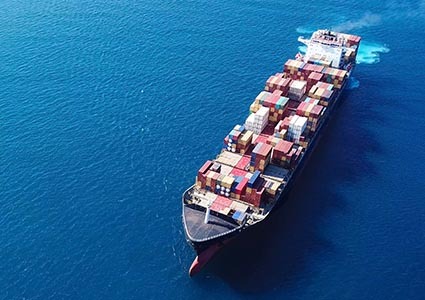
Predictions and challenges for the shipping industry
As the shipping industry sets sail for 2024, it faces a multitude of challenges amid a stormy international landscape. Navigating the intricacies and logistical hurdles of transporting goods, many companies find themselves grappling with myriad complex predicaments.
Global events, such as supply chain disruptions and increased e-commerce have caused capacity constraints and imposed unprecedented demands on the industry. Further complicating matters, fluctuating fuel costs demand agile cost-management approaches to navigate operational intricacies.

As we step into the new year, the industry finds itself at the crossroads of uncertainty and opportunity. But let’s look at the challenges for 2024, and the ways companies can navigate around them to head towards sustainable growth and success in this dynamic environment.
Keeping compliant
Understanding the intricacies of customs and regulatory compliance poses massive challenges, with potential costly delays for any mishaps. It is further complicated by geopolitical uncertainties, evolving trade dynamics, and shifting policies, prompting companies to reassess their operational strategies.
One example of such regulatory intricacies is the Import Control System (ICS2), implemented in March 2023 and now deeply integrated into the EU framework. The launch of phase two of ICS2 introduces an advanced cargo information system, reinforcing the enforcement of customs safety and security regulations. The primary goal is to enhance protection for the single market and EU citizens. Under the ICS2, all international shipments must comply with additional data requirements mandated by the legislation.
The EU has issued a stern warning, declaring its intent to halt any shipments entering or passing through EU territories that fail to adhere to these regulations. Non-compliant shipments will be intercepted and returned to the sender, incurring outbound and inbound shipment charges, and potentially attracting fines.
It is crucial to note these regulations extend beyond shipments to EU territories alone. According to the EU’s directive, all international shipments destined for an EU territory, passing through any EU territory, or utilizing an EU carrier hub (for instance, 82 percent of international shipments routed through an EU carrier hub before reaching destinations in the Americas) will be subject to ICS2 regulations.
The industry has to understand the implications of ICS2 for international shipments. Companies must regularly update knowledge on geopolitical shifts, trade dynamics, and policy changes to ensure operational strategies remain agile and compliant. In a landscape where non-compliance can lead to intercepted shipments and fines, knowledge is not just power, it’s a shield against costly setbacks.
Going green
With an eye on environmental sustainability, the pressure intensifies for shipping companies to implement eco-friendly practices. Embracing technological advancements and automation tools is crucial for competitiveness, with real-time tracking, route optimization, and advanced sorting systems becoming industry standard to help with sustainability.
Navigating sustainability reporting regulations, or ‘ESG regulations,’ can be challenging, but there’s a global push to enhance the consistency, accuracy, and transparency of disclosure requirements.
In the shipping and logistics sector, mirroring other industries, ESG reporting spans various topics, including recycling, greenhouse gas emissions, air pollutants, ecological impacts, business ethics, employee health and safety, and accident and safety management.
The importance of sustainability considerations is growing across businesses of all sizes, extending its reach to organizations involved in shipping goods. Companies can no longer overlook the escalating number of global sustainability reporting laws and regulations.
To pave the way for a greener and more responsible future, organizations should prioritize sustainability in their shipping practices. Staying well-informed about ESG regulations and ensuring compliance with global reporting laws are essential steps to ride the wave of environmental responsibility in the shipping industry.
Security of goods
Ensuring security, particularly for high-value or sensitive items, requires stringent measures against theft, damage, or loss throughout the supply chain. Proactive and comprehensive security is essential to mitigate the vulnerability of goods during transit. 
The challenges of last-mile delivery logistics are heightened in diverse environments, including urban, suburban, and rural areas. According to Overhaul’s Global Threat Assessment 2023, theft remains a constant issue, notably in Europe where Germany and Great Britain record the highest incidences. Criminal gangs exploit vulnerabilities at rest stops, petrol stations, and other locations, especially when units are unaccompanied.
Tailored strategies are imperative for effective risk mitigation, utilizing innovations such as real-time tracking systems, secure packaging, and advanced surveillance tools.
Collaboration with local law enforcement, implementing GPS tracking on vehicles, and utilizing secure transport routes significantly enhances overall shipment security. In the face of evolving threats, adopting a proactive and multifaceted security approach becomes a strategic imperative.
Addressing the complexity of security challenges in shipping necessitates strategic investments in technology, employee training, and collaboration with authorities. A proactive and comprehensive security strategy is not merely protective; it represents a proactive commitment to building a resilient and secure supply chain.
Adapting to the landscape
In the competitive shipping landscape, companies must distinguish themselves through exceptional services, competitive pricing, and a commitment to service quality. The key to success lies in meeting heightened customer expectations, focusing on the rapid, transparent, and reliable delivery of goods.
Also, the lasting impact of health and safety regulations, especially in the post-COVID-19 era, demands continuous attention. Ensuring the well-being of employees and customers goes beyond mere regulatory compliance; it is a pivotal aspect of maintaining business continuity.
Successfully navigating these challenges needs a blend of strategic planning, investments in technology, adherence to robust compliance practices, and adoption of agile operational models. Additionally, the ability to swiftly adapt to evolving global conditions is paramount for the success of any shipping company in today’s dynamic and unpredictable international climate.
For a list of the resources used in this article, please contact the editor.
Jon White is Chief Commercial Officer, EMEA at InXpress. Built on over 23 years of insight, InXpress has pioneered world-class technology that’s disrupting traditional shipping services around the globe. The company has invested millions in its high-performance platform to deliver a truly innovative shipping experience that’s proven to save time and money.